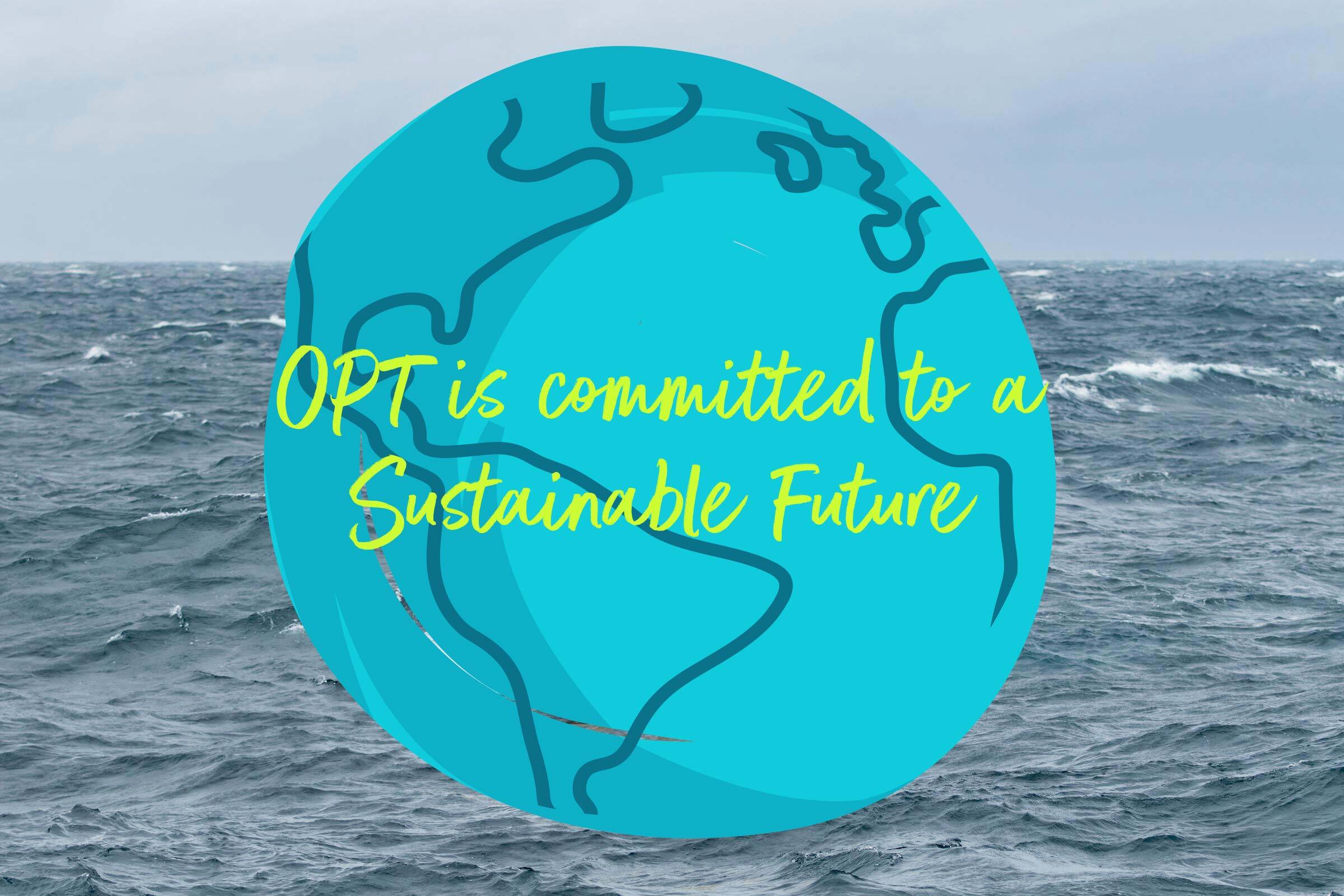Sustainability
More than 70% of our planet is covered in water, yet we know less about our oceans than we know about some planets.

At OPT, we believe that climate change and natural resource depletion are having a fundamental impact on our societies today and could have an irreversible impact on the future.
Therefore, understanding our oceans and safeguarding the resources contained within, above, and below them requires autonomous and clean energy resources.
The “Blue Economy” impacts all of us, and at OPT we are proud to be innovating and working to deliver solutions that help manage its impact. Our current and planned solutions are ideally suited to enable our customers to lower their cost and carbon emissions that are associated with offshore defense and security and ocean energy production.
OPT’s focus is on delivering products and solutions geared towards marine data, power, and services, with an emphasis on sustainability, protection of our ocean resources and being a key contributor towards improving the Blue Economy.
Building on our long history of innovation, OPT is proud to support the United Nations’ Decade of Ocean Science for Sustainable Development. The Company recognizes the importance of Environmental, Social and Governance (ESG) as essential elements to its success, delivering products that help reduce our customers’ carbon emission and preserve our oceans’ natural resources. As such, our Board of Directors has established an Environmental and Sustainability Committee (ES), which assists the Board of Directors in fulfilling its oversight responsibilities by assessing the effectiveness of the Company’s programs and initiatives that support environmental stewardship, social responsibility, and sustainability policies, programs, and practices of the Company. The Company is committed to delivering innovative products and solutions while simultaneously working with high integrity, quality, a strong governance culture and respect for our employees, customers, vendors, and the people in the communities where we do business. In line with this commitment, the Company’s products and solutions support Sustainable Development Goal 14 (Goal 14 or SDG 14) which aims to protect and ensure “life below water” and is one of the 17 Sustainable Development Goals established by the United Nations in 2015. The Company’s products & services align with this goal by offering a means to mitigate IUU fishing, collecting ocean data to support climate science research, and removing carbon emitting energy sources from our oceans. The Company believes that consideration of ESG matters is important to how it, and its solutions and services affect the environments, communities, and societies in which it operates around the world. By adhering to international, national, and local customs, we believe we meet our governance obligations from the environment to personnel to safety. Despite our size, the Company views itself as a responsible corporate citizen throughout the execution of its operations, as emphasized by its goal to provide low-carbon power and data solutions for offshore industries, scientific research, and territorial security.
It is the Company’s goal that all products have a minimal environmental impact footprint compared to alternative solutions. This includes minimizing the emissions for both our facilities and products, implementing, and deploying a database to track our carbon savings, utilizing renewable energy to power offshore data solutions, and providing products and solutions that monitor sensitive ecological areas. Each deployed PowerBuoy® operating in place of fossil fuel-based power in PaaS applications can directly displace four tonnes of carbon annually, or roughly the amount of carbon produced by two average automobiles. When combined with our MDAS for applications typically serviced by a manned guard vessel powered by diesel fuel, this can indirectly displace more than 300 tonnes of carbon for every 10 vessel days replaced, or the equivalent of removing more than 125 cars from the road. The WAM-Vs® are used in many applications, as described in previous sections, with one of the most common being hydrographic surveys. WAM-Vs® can either replace a manned vessel for near shore surveys or serve as a force multiplier to expand the range and speed of offshore surveys for a manned survey vessel. Each survey vessel day replaced by a WAM-V® can displace over 14 tonnes of carbon. Over a full survey season, this could exceed 1300 tonnes of carbon displacement, the equivalent of more than 500 cars worth of annual emissions. During fiscal 2023, the Company worked with the NJ Clean Energy Program to conduct an energy audit and benchmarking report to compare our NJ facility’s energy usage to other commercial buildings in similar industries and provide recommendations to improve efficiencies. The Company also performed an audit of the carbon footprint for all Company business travel. Carbon offsets were purchased which exceeded the total carbon footprint of the annual NJ facility energy usage and Companywide business travel. During fiscal 2024, this audit will be extended to cover the new California facility.
In parallel, the Company has initiated an environmental impact assessment on our products, starting with the PowerBuoy®, with a focus on the potential of any environmental hazards of materials. Further data is being gathered around the PowerBuoy® to determine the risk to marine life including risk associated with our batteries. For recent deployments, we received a permit from the US Army Corps of Engineers and confirmation from the United States Department of Commerce National Oceanic and Atmospheric Administration that the PowerBuoy® installation poses no material risk to marine life. Our batteries contain no toxic or rare earth metals and have a minimal risk of fires or explosions. In the unlikely event that water comes into contract with live batteries, wireless remote operation allows for the immediate discharge of energy to mitigate the risk of electrolysis that could create an explosive mixture of hydrogen and oxygen within the buoy. Further research is being performed into hazardous materials and any other risks related to our WAM-V® product line, including risk associated with the batteries we use in this product.